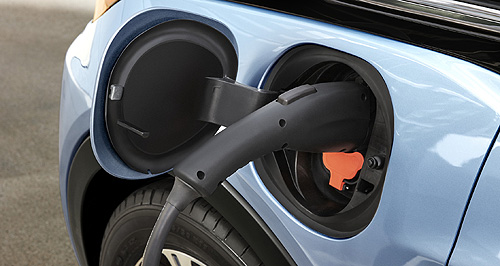Make / Model Search
News - General News - EmissionsMore pressure on government to tackle emissionsPlugged in: FCAI chief executive Tony Weber said that the debate around alternative fuel technologies has not matured in Australia. FCAI will continue discussions with government in 2016 for support of green car tech7 Jan 2016 THE head of the Federal Chamber of Automotive Industries (FCAI) says the peak body will continue to push the federal government for better support of environmentally friendly vehicles in Australia in a bid to further reduce fleet emissions. Speaking at the announcement of the 2015 new-vehicle sales results, FCAI chief executive Tony Weber said Australia's automotive sector made up a tiny portion of overall emissions and praised car-makers for their commitment to green technologies. “New passenger cars, SUVs and light-commercial vehicles contribute less than one per cent of Australia's total annual greenhouse gas emissions,” he said. “While the contribution is low, vehicle manufacturers selling light vehicles in Australia are committed to developing and delivering new technology that reduce CO2 emissions. “Their commitment shows in the average year-on-year reduction of 2.4 per cent over the past decade. Cumulatively that is a more than a 20 per cent improvement in a decade.” Mr Weber detailed measures that could have an impact on emissions and said it would continue to have discussions with the federal government about emissions reductions. “It's also important to understand that further reductions require a whole-of-government approach, and the FCAI will work with the government to ensure all areas of vehicle emissions are understood. “The whole-of-government approach needs to include policies on vehicle technology, fuel quality, alternative fuels and energy platforms, driver behaviour, infrastructure improvements to reduce congestion, price signals and reducing the age of the in-service fleet. “The FCAI and its members are working with the government on this matter and recently attended the first meeting of the government's ministerial forum that is undertaking a whole-of-government approach to addressing vehicle emissions.” Mr Weber said the adoption of vehicle-to-vehicle technology could also help reduce overall vehicle emissions. “Infrastructure improvements are critical. This is why we see Cooperative Intelligent Transport Systems as so important. I have seen figures that (show) if Cooperative Intelligent Transport Systems were brought into the market, you could get a 10 per cent reduction in emissions. That’s quite remarkable. Not only to say what it does for safety and congestion.” Mr Weber said Australia was trailing some other developed nations in terms of supporting alternative fuel technology, but added that there would be more discussions with government this year.  Left: FCAI chief executive Tony Weber. “I think the debate hasn’t matured in this country as it has in some other countries in the world. So I think this is what we are going to go through in 2016, we are going to go through the entire debate with commonwealth government and state and territories. Left: FCAI chief executive Tony Weber. “I think the debate hasn’t matured in this country as it has in some other countries in the world. So I think this is what we are going to go through in 2016, we are going to go through the entire debate with commonwealth government and state and territories.“You do not get the enormous gains that are potentially out there unless there is a contribution from the government and a change in the environment in which we operate in. That includes things like refuelling stations. You need to have transport that works for people. And therefore you need the infrastructure and all its many guises in place to make it work.” In the wake of the Volkswagen Group diesel emissions cheating scandal, some consumer groups and automotive manufacturers – including PSA Peugeot Citroen – have called for real-world CO2 emissions and fuel economy testing to replace the existing laboratory tests. Mr Weber said the FCAI and its members support the introduction of new testing protocol, but cautioned that it must be uniform. “The members I have spoken to are very happy to take that approach. The problem is you need to have an apples-for-apples comparison and the laboratory test gives you that. You need to have that because what you want is consumers to go and look at vehicle A and they will compare that to vehicle B and C and they will make an informed judgement about its environmental performance. Fuel efficiency is a big issue for consumers, there is no doubt about that.” When asked whether the VW scandal will have a further impact on diesel passenger car sales in Australia, Mr Weber changed tack and highlighted the alternative technologies that are heading to market soon. “I think there is a whole raft of technologies in the pipeline and also in the marketplace at the moment. Those technologies have different advantages and consumers actually look at that and are making decisions. “As an organisation we are technology neutral because we leave it to our members to actually work out what they think is the best product to bring into market. I think this is going to be an interesting area and I think it will evolve quickly in the next few years. Which way it evolves I just do not know.” Sales of diesel passenger vehicles dropped in Australia last year, with private diesel volumes dropping by 24 per cent compared with 2014, while business purchases were down by almost 20 per cent.  Read more |
Click to shareGeneral News articlesResearch General News Motor industry news |












Facebook Twitter Instagram